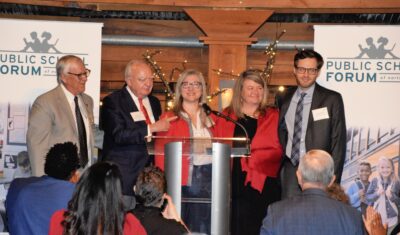

To mark National Teacher Appreciation Week, May 8-12, the U.S. Census Bureau sent out a tranche of education data with a “key stats” chart showing the remarkable reach of the teaching profession across America. Census estimates that the nation has nearly 6 million teachers, ranging from tutors and teaching assistants, to preschool and K-12 classroom teachers, to college and university teachers.
It is no surprise that the Census Bureau press release cites the 2023 teacher-appreciation proclamation of President Joe Biden. But without explanation, it also features the 1986 proclamation of President Ronald Reagan, who opened with a flourish by quoting the journalist-novelist-historian Henry Adams, the great-grandson and grandson of presidents.
“When Henry Adams wrote, ‘A teacher affects eternity; he can never tell where his influence stops,’ he expressed a sentiment that any student could share,” says the Reagan proclamation. “Teachers help us learn to read, to write, and to count — and how to study. By word and example, teachers impart moral and civic values. During our most formative and impressionable years, teachers help us understand ourselves and the world around us.”
Probably for most of us, our “formative and impressionable years” were influenced by parents, extended family, friends in neighborhood and school, as well as by the circumstances and events of the times. For me, in the front edge of the post-World War II baby-boom generation, civil rights, the Vietnam conflict, the Kennedy assassination, the space race, and suburbanization shaped the cultural and political context of the school-age years.
A teacher-appreciation day or week is not only a moment to give a small gift as a token of gratitude for your children’s teachers. For me, it also stirs memories and reflections on the enduring influence of teachers who made a difference — the middle school teacher who alerted my parents to university-based speech therapy to deal with my stuttering, the high school teacher who diverted me from the baseball team to broaden my education by managing a stage production, the university faculty adviser who supported my efforts to transform a campus newspaper into a newsy, issue-oriented publication, and the graduate school professor who arranged for a national magazine to publish my final paper on school desegregation.
What’s more, this week has reinforced for me how deeply my family has built careers in public education. Of my two daughters, one teaches third grade, one is engaged in early childhood policy. Of my siblings and their spouses, six have had careers in teaching, coaching, and administration. In addition to joining the UNC-Chapel Hill faculty, I served eight years on the board of trustees of the North Carolina Center for the Advancement of Teaching, learning the value of the state’s investment in treating preK-12 teachers as professionals.
Among the data it provided for background during Teacher Appreciation Week, the Census Bureau included a link to its 2022 analysis of teacher compensation in relation to similarly educated professionals — such as physical therapists, biological scientists, judicial law clerks, and statisticians.
“Although teachers are among the nation’s most educated workers, they earn far less on average than most other highly educated workers and their earnings have declined since 2010,” said the Census analysis. “More than 95% of elementary, middle and high school teachers have a bachelor’s degree or more. Yet teachers’ average earnings do not keep up with other highly educated occupations, even when accounting for age and sex.”
Increasing compensation is not really about showing “appreciation,” but about treating incumbent teachers equitably and assuring a pipeline of well-qualified educators to teach in hard-to-staff schools, to teach specialized subjects, and to match more closely the racial and ethnic profile of students. Aside from pay, stresses arising from post-pandemic political and cultural battles serve to suppress the will to teach among both young aspirants and veteran educators.
The most recent PDK poll — an annual survey for over half a century — found “conflicted views” amid the contentious great debate over public education. Seven out of 10 public school parents express trust and confidence in public school teachers; and yet, fewer Americans “than ever expressed interest in having their child work as a public school teacher.”
As the poll was conducted in 2022, says the PDK commentary, “Parents and activists were expressing their anger over COVID-19 policies, the availability of books they deemed inappropriate, the fear that critical race theory was infusing school curricula, and school policies and practices for addressing gender identities and sexualities. Of course, we know that the loudest voices are just that — the loudest voices. They do not necessarily represent the views of the wider community.”
Of course, those voices have driven legislation in North Carolina and other states. Even amid the tumult, the PDK poll found what surveys have long detected: that Americans give higher ratings to their local public schools than to schools across the nation.
“When it comes to public education, familiarity may breed support and trust,” says the PDK commentary — and that’s a soft cheer of appreciation for teachers who affect eternity.




